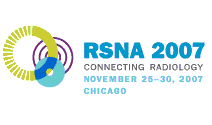
Abstract Archives of the RSNA, 2007
SSQ05-07
Impact of Lymphotrophic Nanoparticle-enhanced MRI (LNMRI) on Therapeutic Management of Patients with Bladder Cancer
Scientific Papers
Presented on November 29, 2007
Presented as part of SSQ05: ISP: Genitourinary (Lower Tract Oncology)
Mansi Awasthi Saksena MD, Presenter: Nothing to Disclose
Shahin Tabatabaei, Abstract Co-Author: Nothing to Disclose
Marta Braschi MD, Abstract Co-Author: Nothing to Disclose
Elisa Ventura MD, Abstract Co-Author: Nothing to Disclose
Douglas Dahl MD, Abstract Co-Author: Nothing to Disclose
Mukesh Gobind Harisinghani MD, Abstract Co-Author: Nothing to Disclose
To determine the impact of LNMRI on therapeutic decision making in patients with transitional cell carcinoma of the bladder.
24 patients (M:F; 19:5) with a mean age of 72 years (range 50 – 89 years) were included in the study. All patients had pathologically proven grade 3/3 transitional cell carcinoma of the bladder and underwent conventional staging procedures including CECT of the chest and abdomen. In addition the patients also underwent LNMRI studies for nodal evaluation. An urologist blinded to the LNMRI results was initially presented with de-identified pertinent clinical information in each patient and was asked to commit to a therapeutic option. 2 weeks later the patient data were re-evaluated in a random fashion by the same urologist now in conjunction with the LNMRI results. A therapeutic option was again determined and documented. Number of cases with alteration in treatment was documented.
Knowledge of LNMRI resulted in altered management in 6/24 (25%) patients. LNMRI specifically prevented needle biopsy of pelvic lymph nodes in 5/24 (20.8 %) patients where it demonstrated unenlarged retroperitoneal nodal metastatic disease in the absence of pelvic involvement. In 1/24 (4.2 %) patient radical cystectomy was prevented due to the detection of micrometastatic disease in the small abdominal lymph nodes. In 18/24 (75%) patients it did not provide any additional information compared to a staging contrast enhanced CT scan of the abdomen and pelvis.
LNMRI provides additional staging information that impacts therapeutic decision making in patients with TCC of the bladder. By demonstrating nodal metastastic disease in the retroperitoneum and abdomen, that may be missed by conventional imaging, it can avoid invasive procedures like needle biopsy and surgery.
Additional nodal staging information obtained by LNMRI could alter therapeutic strategies in patients with bladder cancer and may obviate invasive procedures like needle biopsy.
Saksena, M,
Tabatabaei, S,
Braschi, M,
Ventura, E,
Dahl, D,
Harisinghani, M,
Impact of Lymphotrophic Nanoparticle-enhanced MRI (LNMRI) on Therapeutic Management of Patients with Bladder Cancer. Radiological Society of North America 2007 Scientific Assembly and Annual Meeting, November 25 - November 30, 2007 ,Chicago IL.
http://archive.rsna.org/2007/5013869.html

